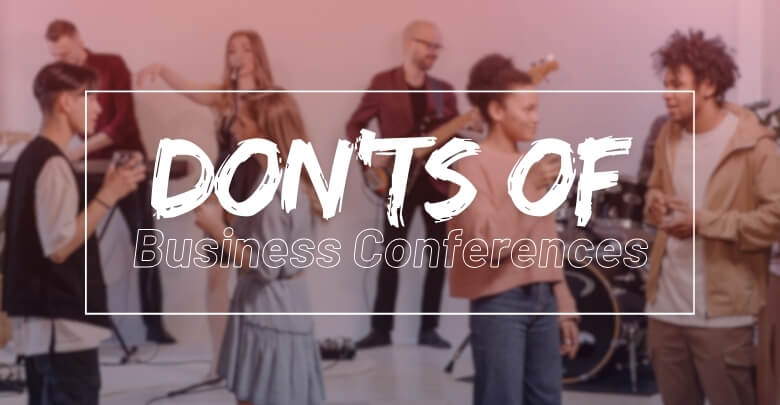Attending business conferences is a precious experience for professionals and businesses alike. These events offer opportunities to network with peers, learn about new industry trends and technologies, and gain insights from expert speakers.
However, to make the most out of these events, it’s crucial to understand the do and don’t of attending business conferences.
Some key do’s include dressing appropriately, choosing conferences that align with your interests and professional goals, bringing plenty of business cards, and engaging in meaningful conversations with fellow attendees.
On the other hand, some key don’ts include attending passive business meetings, collecting business cards without meaningful conversations, bringing unnecessary people to the event, and neglecting to follow up with contacts after the event.
In this content, we’ll explore the top do and don’ts of Business Conferences to help you get the most out of these valuable events.
Benefits of Attending Business Conferences
Attending business conferences provide a range of benefits for professionals and businesses. Here are some of the key benefits:

- Learning Opportunities: Conferences offer the opportunity to learn from industry experts and thought leaders, attend workshops and seminars, and gain valuable insights into emerging trends and technologies.
- Networking Connections: It provides an opportunity to network with other professionals in the same industry, including potential clients, partners, and suppliers. Building these connections helps to expand business opportunities, generate leads, and form valuable partnerships.
- Valuable Industry Insights: Conferences offer the chance to gain valuable insights into industry trends, challenges, and opportunities.
- Exposure To New Products And Services: Exhibitions and trade shows often occur alongside conferences, allowing attendees to discover new products and services that improve their business operations.
- Professional Development: Attending conferences contributes to ongoing professional development, vital for career advancement and job performance. It also demonstrates a commitment to continued learning and staying up-to-date with industry developments.
- Branding And Visibility: Conferences help to build brand awareness and visibility, particularly if attending as a speaker or exhibitor. This help to establish a business as a thought leader and build credibility in the industry.
Do And Don’t of Business Conferences
Attending a business conference is a great way to network, learn new skills, and stay up-to-date with industry trends. In the following part, we will highlight the do and don’ts of business conferences and other related details.

Do’s of Business Conferences
When attending a business conference, you’ll need to follow some do’s to make the most of the experience. Below are some descriptions of the mentioned do’s:
1. Dress Appropriately In Business Casual Attire
Dressing appropriately is essential to make a good impression and show respect for the event and fellow attendees. Most business conferences require business casual attire.
This includes slacks or khakis, a collared shirt, dress shoes for men, a dress, skirt, or slacks paired with a blouse or sweater, and dress shoes for women.
Economics conferences tend to have a more formal dress code. Men should consider wearing a suit or blazer with dress pants and shoes. Women can opt for a dress, skirt suit, or dress pantsuit with dress shoes.
2. Choose Conferences And Events That Are Worth Your Time And Efforts
Attending a conference takes time and effort, so choosing the ones that align with your interests and professional goals is important. Research the conference beforehand to ensure it’s worth your time and investment.
3. Bring Plenty Of Business Cards And Distribute Them Effectively
Business cards are great for exchanging contact information and networking with fellow attendees. You should bring enough and distribute them effectively to people you meet who are relevant to your professional goals.
4. Make Eye Contact And Engage In Meaningful Conversations With Fellow Attendees
Networking is crucial to attending a business conference. Engaging in meaningful conversations leads to valuable connections and insights. Make eye contact and actively listen to the person you speak with to establish a genuine relationship.
5. Follow Business Meeting Etiquette To Make A Good Impression
Business meeting etiquette includes arriving on time, turning off your phone, avoiding interrupting others, and being respectful to everyone in the meeting. These small actions make a big difference in your impression of others.
6. Schedule Time For Breaks And Manage Your Time Effectively
Attending a conference is overwhelming, so scheduling breaks to recharge and manage your time effectively is essential to avoid burnout. You should prioritize the sessions that are most important to you and plan accordingly.
7. Do Some Background Homework Before Attending The Event To Be Better Prepared
Researching the conference and speakers beforehand helps you be better prepared and make the most of the experience. Take notes on the topics you’re interested in and prepare some questions to ask during Q&A sessions.
8. Use Email For Follow-Up And Communication After The Event
Following up with fellow attendees and speakers after the conference is a great way to solidify the connections you’ve made and continue building your professional network. Use email to thank people you met and follow up on any potential opportunities that arose during the conference.
Don’ts of Business Conferences
When attending a business conference, there are certain things you should avoid to ensure that you get the most out of the experience. The Following are some key don’ts to remember as you prepare for your next conference.
1. Don’t Waste Time Attending Passive Business Meetings that Don’t Provide Value or Insights
Passive business meetings are those where participants sit and listen without actively participating. Attending such meetings wastes time and energy as they don’t offer new ideas or knowledge.
2. Avoid Collecting Business Cards Without Meaningful Conversations
Collecting business cards without meaningful conversations makes networking efforts ineffective. Networking is all about building relationships and making connections, which is done by exchanging business cards.
3. Don’t Bring Unnecessary People to the Event
Bringing unnecessary people to the event distracts you from focusing on the event’s purpose. It also takes away the opportunity for other attendees to engage with you and build relationships.
4. Avoid Arriving Late to Meetings and Sessions
Arriving late to meetings and sessions disrespects the speaker and other attendees. It also disrupts the event’s flow and makes catching up on important missed information difficult.
5. Don’t Overload the Meeting Agenda and Topics
Overloading the meeting agenda and topics is overwhelming for attendees and makes it challenging to have productive discussions. So, you should have a clear and concise agenda to ensure the meeting achieves its intended purpose.
6. Avoid Participating in Background Noise and Distracting Activities
Participating in background noise and distracting activities is disrespectful to other attendees and prevents them from being able to engage in the event fully. Being mindful of others and creating a professional and respectful atmosphere is essential.
7. Don’t Neglect Following up With Contacts After the Event
Following up with contacts after the event is essential for building relationships and maintaining connections. Failing to follow up damages relationships and harms your networking efforts.
Tips for Making the Most out of Business Conferences
To make the most out of events at a conference, you should be well-prepared and have a clear action plan. Below are some tips for making the most out of business conferences.
- Identify a List of People to Meet in Advance: Before attending the conference, list people you would like to meet and interact with at the event. This includes fellow business owners, industry leaders, potential clients or partners, and anyone relevant to your career or business.
- Attend a Mix of People and Sessions: Attend sessions and events relevant to your interests and career goals. This helps you broaden your perspective, learn new skills, and make new connections.
- Participate in Brainstorming Sessions and Breakout Sessions: Brainstorming and breakout sessions help generate new ideas, network with like-minded individuals, and improve problem-solving skills.
- Take Advantage of Career Resources and Opportunities: Attend career development sessions, visit career resource booths, explore job opportunities to improve your career prospects, and learn about new trends in your industry.
- Utilize Audio and Video Recordings of Sessions: Many conferences offer audio or video recordings of sessions and events. Utilize these resources to review and revisit information you have missed or reinforce your learning after the conference.
Conclusion
After reading this article, we hope you understand the do and don’t of business conferences. With these tips in mind, you’ll be well-equipped to make the most of your next business conference.
Attending business conferences is an excellent opportunity for professional growth and networking. It helps you learn more about business management and economics.
You can make the most of your time and effort spent at these events by following the do and don’t. Remember to research the conference beforehand and plan your time accordingly.
Dress appropriately in business casual attire, converse with fellow business owners and leaders, be mindful of time during sessions, and ask relevant questions.
Follow proper business meeting etiquette and rules, and take breaks to manage your time effectively. Don’t forget to bring plenty of business cards and follow up with contacts after the event.






